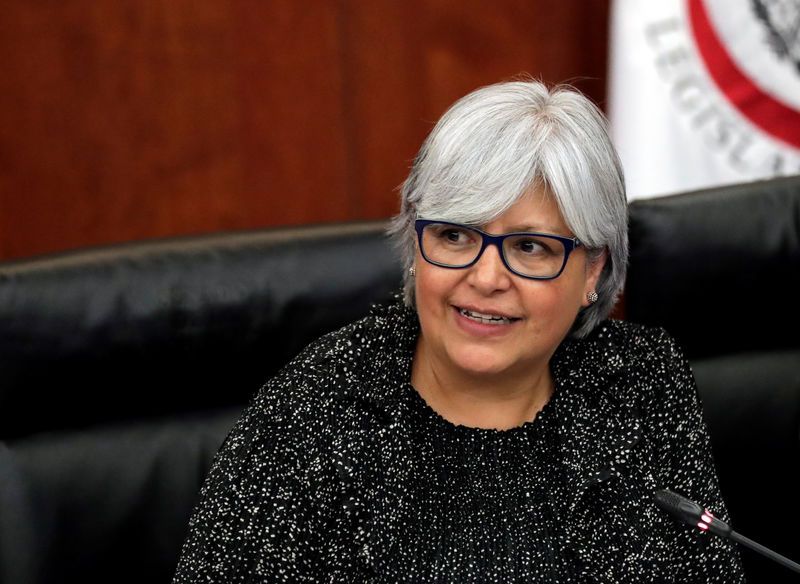MEXICO CITY, (Reuters) – Mexican and U.S. officials were preparing on Sunday for upcoming talks aimed at averting a major trade clash after U.S. President Donald Trump vowed to impose punitive tariffs on all Mexican goods in an intensifying dispute over migration.
Mexican Economy Minister Graciela Marquez said on Sunday she would meet with U.S. Commerce Secretary Wilbur Ross in Washington on Monday, as the two governments begin holding talks to resolve the issue in the U.S. capital in the coming week.
Trump says he will apply tariffs of 5% on Mexican goods on June 10 if Mexico does not halt the flow of illegal immigration, largely from Central America, across the U.S.-Mexican border.
The U.S. president lashed out on Twitter on Sunday morning, calling Mexico an “abuser of the United States, taking but never giving,” and repeating his tariff threats. He doubled down a few hours later.

“Mexico is sending a big delegation to talk about the Border. Problem is, they’ve been ‘talking’ for 25 years,” Trump wrote. “We want action, not talk. They could solve the Border Crisis in one day if they so desired. Otherwise, our companies and jobs are coming back to the USA!”
The tariffs will gradually rise to 25% if Mexico does not comply with Trump’s demands. That threatens major economic damage to Mexico, which sends about 80% of its exports to the United States.
Mexican President Andres Manuel Lopez Obrador hinted on Saturday that his government could agree to tighten migration controls to defuse Trump’s threat, and said he expected “good results” from the talks in Washington.
Speaking on Sunday afternoon at an event to mark the start of construction on an oil refinery in southern Mexico, Lopez Obrador did not refer directly to the trade dispute, but said he wanted to send a “memorandum” to the American people.
“The Mexican government is a friend of the United States government. The president of Mexico wants to stay friends with President Donald Trump. But above all, we are friends of the American people,” Lopez Obrador said.
In words directed at the U.S. public, he added: “We want nothing and no one to break our beautiful and sacred friendship.”
DELEGATION
Foreign Minister Marcelo Ebrard is heading the Mexican delegation, which includes Marquez. Marquez said she spoke to Ross during the inauguration of El Salvador’s new president on Saturday, without giving details.
Ebrard is expected to meet U.S. Secretary of State Mike Pompeo for talks on the crisis on Wednesday, although Mexican officials say they will be holding other meetings beforehand.
Trump’s ultimatum has hurt Mexican financial assets and global stocks, but it met resistance from U.S. business leaders and lawmakers worried about the impact of targeting Mexico, one of the United States’ top trade partners.
In his Sunday Twitter broadside, Trump also hit out at U.S. companies operating in Mexico.
“Our many companies and jobs that have been foolishly allowed to move South of the Border, will be brought back into the United States through taxation (Tariffs),” Trump wrote. “America has had enough!”
Lopez Obrador said on Saturday that Mexico would not engage in a trade war, but noted that his government had a “plan” in case Trump did apply the tariffs, without providing details.
He also noted that Mexico reserved the right to seek international legal arbitration to resolve the dispute.
Some Mexican business groups have urged the government to strike back against any Trump tariffs.
On Friday, Mexico’s top farm lobby said Lopez Obrador should target agricultural goods from states that support Trump’s Republican Party if the U.S. president carries out his threat.
Apprehensions at the U.S. border with Mexico have surged in recent months, although Mexican data also show more deportations and detentions at Mexico’s southern border with Guatemala, mostly of Central Americans trying to reach the United States.
The bulk of migrants are fleeing widespread violence and poverty in Guatemala, Honduras and El Salvador. Many seek asylum in the United States when they cross the border.
Trump is pushing Congress to change U.S. law to make it more difficult for the migrants to claim asylum.









